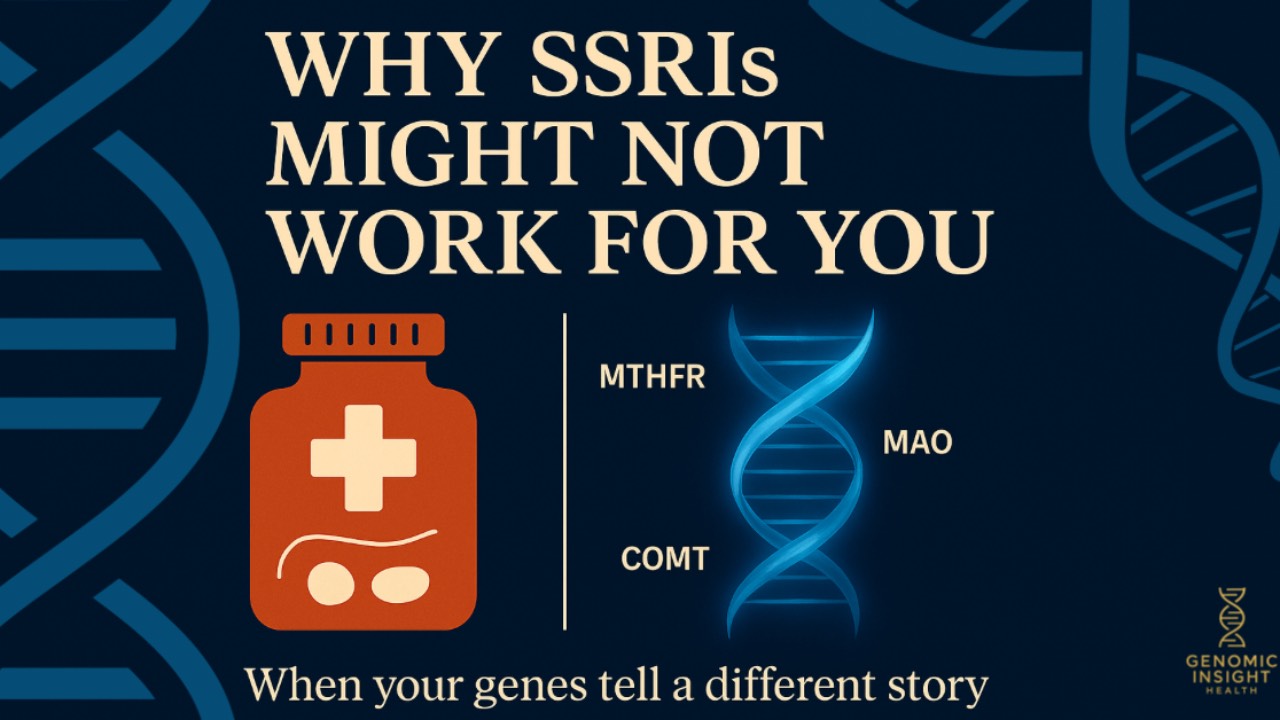Why SSRIs Might Not Work for You: A Genetic Deep Dive

When antidepressants backfire and how your genes may hold the answers.
You started the medication because you wanted to feel better.
More stable.
More like yourself.
And maybe at first, there was a flicker of that. A little calm. A little less heaviness.
But then came something else.
You started feeling numb. Detached. Like you weren’t sad anymore, but you weren’t really anything. Or maybe your anxiety got worse. You couldn’t sleep. Or you felt more restless, less clear.
And then that quiet thought showed up:
“What if this isn’t helping me at all?”
If that’s happened to you… or is happening right now, you’re not the only one.
And no, you’re not doing it wrong.
The truth is, antidepressants like SSRIs don’t work for everyone. Not because people don’t want them to. And not because they’re weak or resistant or ungrateful.
But because sometimes, the body doesn’t respond the way we expect it to.
And for some people, that’s written into their DNA.
What Are SSRIs and Why Don’t They Work for Everyone?
The Basics of Why Not Everyone Does Well on Antidepressants
SSRIs (Selective Serotonin Reuptake Inhibitors) are medications like Lexapro, Prozac, Zoloft, and Celexa. They’re designed to increase the amount of serotonin available in the brain by blocking its reabsorption (or “reuptake”) into neurons.
The theory is simple:
More serotonin = better mood.
But human brains aren’t simple.
And serotonin is only one piece of a very complex puzzle.
The Problem with One-Size-Fits-All Approaches
Some people take SSRIs and feel dramatically better. That happens. And it’s real.
But others?
They feel nothing. Or worse.
Side effects can show up fast or months later. Doses might seem too strong or too weak.
And some people go through med after med without ever really finding relief.
This isn’t random.
In many cases, genetics may explain why.
Real-Life Symptoms That Might Point to a Genetic Mismatch
Have You Experienced Any of These on SSRIs?
- Feeling emotionally flat or detached
- Increased anxiety or panic
- Trouble falling or staying asleep
- Foggy thinking, slowed speech, disconnection
- Jaw clenching or restlessness
- No noticeable benefit after 6–8 weeks
- A sense of “losing your spark”
These May Be Clues… Not Failures
Most people are told to just “wait it out.” Or “try a different dose.”
But when the same issues show up again and again, there’s usually something deeper at play.
Let’s talk about what that might be.
The 4 Genetic Reasons SSRIs Might Not Work for You
1. MAO-A or MAO-B Variants: Too Much Serotonin Hanging Around
The MAO family of genes helps break down serotonin, dopamine, and norepinephrine.
If your MAO-A or MAO-B enzymes are genetically slow, adding more serotonin (via an SSRI) can actually build up too much, leading to emotional blunting, increased anxiety, or agitation.
People with this pattern often say:
“I don’t feel sad anymore. But I don’t feel anything.”
SSRIs in this case don’t balance your brain… they overload it.
2. COMT V158M Variant: Dopamine Overload and Flat Affect
COMT breaks down dopamine and norepinephrine. If it’s running slow (common in V158M variants), emotional processing can feel heavy or slow.
Add an SSRI, and you might get even more bottlenecked, leading to:
- Low motivation
- Emotional disconnection
- Feeling overstimulated by things like caffeine or B vitamins
This is the person who feels weird on supplements everyone else seems to love.
Or who suddenly can’t tolerate small stressors.
3. MTHFR A1298C / C677T Variants: Low Serotonin to Begin With
If your MTHFR gene isn’t working efficiently, you may not be making enough serotonin in the first place.
SSRIs only move around the serotonin that’s already there, they don’t create more.
So if your methylation pathways are compromised, SSRIs might feel… irrelevant. Or oddly destabilizing.
These are the people who often feel better with folate-rich foods, B12 (if well-matched), or light therapy, not prescriptions.
4. CYP2D6 / CYP2C19 Variants: You Metabolize SSRIs Too Fast (or Too Slow)
These genes control how quickly your liver processes medications.
- Poor metabolizers may accumulate the drug too fast = side effects, sensitivity
- Rapid metabolizers may clear it too fast = no benefit
Imagine two people taking the same dose of Lexapro.
One feels jittery and nauseated. The other feels… nothing.
This is why gene testing matters. Dosing isn’t just about weight or age. It’s about your biology.
So… What Can You Do Instead?
(Without Guesswork)
If You’re Overstimulated by SSRIs…
- You may have slow MAO-A, COMT, or MTHFR
- Try nervous system stabilizers like magnesium glycinate, glycine, taurine
- Avoid overstimulating nootropics or high-dose methylated supplements
- Support gentle detox (sweating, hydration, phosphatidylcholine)
If You Feel Numb or Emotionally Flat…
- Consider slow MAO-A + SSRI overload
- Focus on dopamine support: sunlight, B6, tyrosine, saffron, rhodiola
- Reduce histamine load (can interfere with MAO)
- Explore vagus nerve stimulation or breathwork, not just pills
If You Felt Nothing At All…
- You may be a rapid metabolizer (CYP2D6/2C19)
- Consider targeted amino acids: tryptophan, SAMe, GABA precursors
- Explore non-SSRI options like adaptogens, light therapy, or psychogenetic-guided meds
- And check your methylation status that can make or break response
Should You Stop Your Medication?
That’s not something to do on your own.
SSRIs should never be stopped cold-turkey.
Tapering safely, especially with genetic awareness, can make a huge difference in how you feel during and after the process.
It can also help you figure out what to try next.
If you’re considering stopping or switching medications, talk with someone who understands both psychopharmacology and genetics. It matters. A lot.
How to Learn More About Your Genetics
You don’t need to guess. Or self-diagnose based on internet lists.
Genetic testing can help you see what’s happening inside your brain chemistry and detox pathways, so you’re not just trying things at random. It’s literally your personalized blueprint.
Platforms like MaxGen Labs offer panels like “The Works”, which look at neurotransmitter genes, methylation, detox, and more. If you’re interested click here to learn more. This is the test I use in practice and it’s helped hundreds, if not thousands with the data we’ve learned to personalize care.
If you’re focused on meds specifically, you might also explore GeneSight, which is used clinically to guide psychiatric prescriptions.
This isn’t just about SSRIs.
It’s about clarity.
This Isn’t About Blame… It’s About Better Direction
If your medication didn’t work, or made things worse, it doesn’t mean you’re resistant. Or too sensitive. Or hopeless.
It might just mean that path wasn’t yours.
SSRIs can help to stabilize in many people. But for some, they can flatten the very things you’re trying to reconnect with energy, emotion, clarity, aliveness. Longer term, keep working to gain insights through genetics to work on supporting your body, running pushing against it.
Genetics won’t hand you all the answers. But they can help ask better questions.
And sometimes, that’s the shift that matters most.

